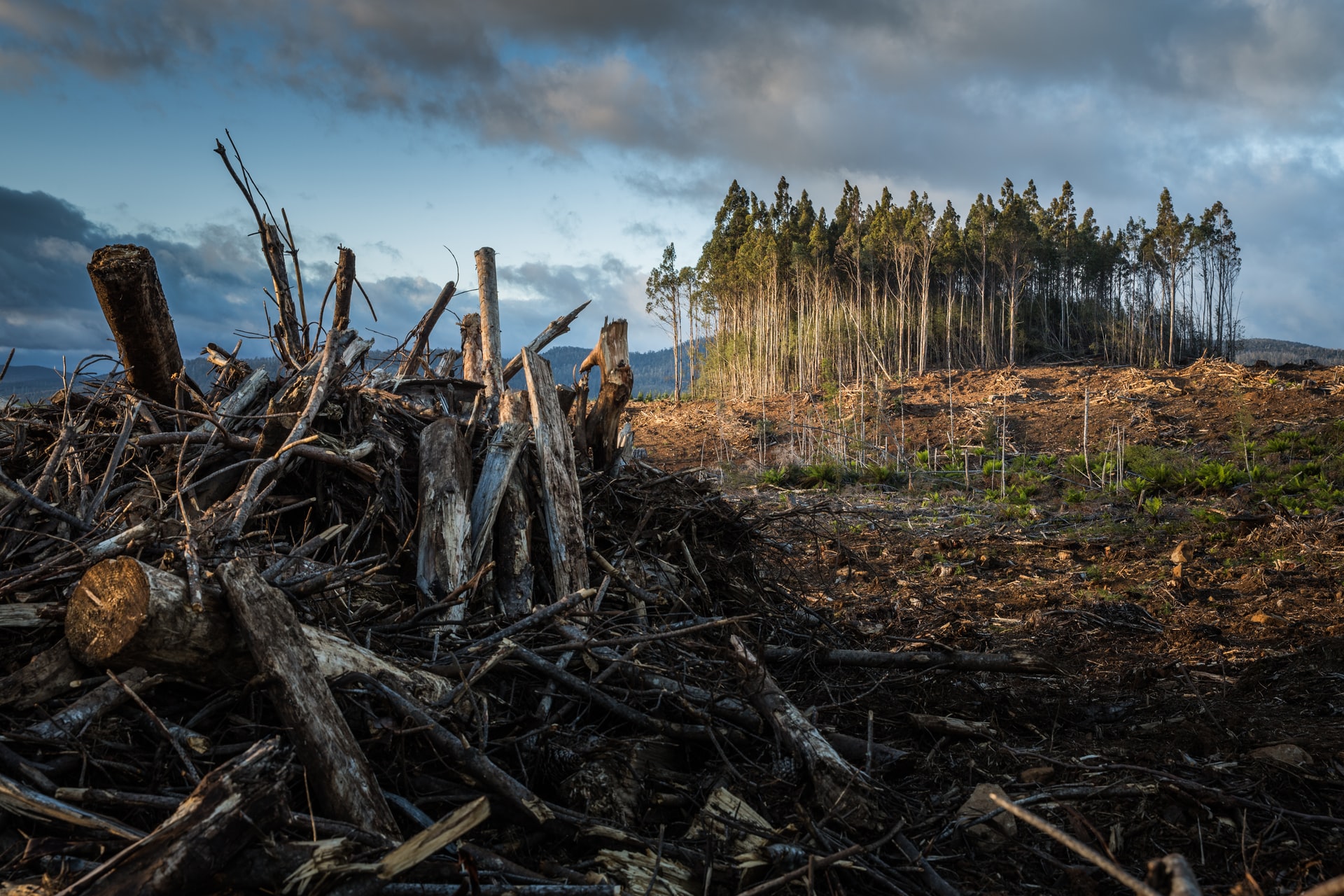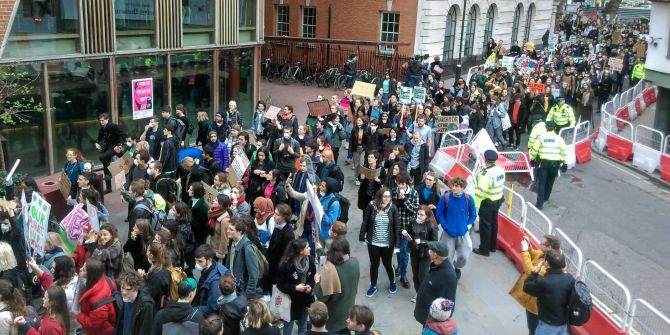Faith and business are two sectors that rarely overlap. However, in light of COP26 and the climate crisis, Shilpita Mathews writes that opportunities for collaboration are present. In this article, Mathews outlines the ways in which these two sectors can engage one another to achieve positive change.
Coinciding with COP26 taking place in Glasgow, the LSE Religion and Global Society blog is pleased to host a new series on the environment and religion, showcasing how faith communities respond to and influence the discourse around climate change. This series will feature voices from specialists, diplomats, and activists on the topic.

For the next two weeks, faith and business leaders from around the world will come together in Glasgow, at the United Nations’ climate change conference, COP26, to influence government decisions that could ultimately determine whether or not we limit global warming to 1.5 degrees, a goal that will require global emissions to be nearly halved by 2030 and for ‘net-zero’ emissions to be achieved by 2050.
Business and industry are at the forefront of financing climate solutions, with private finance accounting for the majority (56%) of climate finance in 2018-2019. Similarly, faith groups represent 80% of the world’s population and faith leaders have a powerful voice in advocating for change. As the UN Faith for the Earth Dialogue, states, “faiths bring a unique morality and ethical lens to the international movement of climate action”. As an environmental economist working in the private sector and a faith-based climate advocate, I am passionate about connecting faith, climate action and economic impact. COP26 is an opportunity to build bridges at time of crisis. At COP26, I have the privilege of being an official Christian Climate Observer, representing the World Evangelical Alliance, and will be eagerly supporting collaborative initiatives between faith and business leaders in the blue zone.
Bridges of hope
There are many examples of successful collaborations between faith leaders and the private sector. For example, the Church of England Pensions Board is a founding member of the Transition Pathway Initiative, at the Grantham Research Institute at LSE, which enables investors to assess portfolios and includes 108 investors globally who represent over $29 trillion combined assets. In January 2020, the FTSE TPI Climate Transition Index was launched, which is a £600 million allocation by Church of England to a new stock index that supports the transition to a low carbon economy.
Similarly, the Economy of Francesco, launched by Pope Francis in 2020, brings together “young men and women studying economics and interested in a different kind of economy: …that cares for the environment and does not despoil it”. Since then, it has become a community of private sector leaders who champion local initiatives which rethink the economic system. This echoes other collaborations, such as the Lausanne Network’s Jamaica Call to Action, advocating for an “economy that works in harmony with God’s creation” and Business as Mission’s creation-care focused entrepreneurs focused on the quadruple bottom-line (economic, social, environmental and spiritual).
Raising ambition
Despite the strides made in the last few years, there remain numerous areas to strengthen partnerships. Together, faith and business leaders can lead a radical approach in working, investing and delivering just climate solutions.
Working with purpose in a time of climate despair
In a recent McKinsey survey of more than 1,000 US employees, 82% affirmed the importance of organisational purpose beyond profits, addressing issues such as climate change or racial inequality. This comes at a time when an increasing number of young workers are battling ecoanxiety. A 2021 survey of 1,000 people aged between 16-25 worldwide, revealed that 60% felt very worried or extremely worried about climate change.
Businesses face the double challenge of addressing existential hope and climate despair at the workplace. Breaking the divide between secular and sacred spaces can help business leaders create inclusive and safe spaces for employees to speak about ecoanxiety and build value-based community. In a theological framework, grief and despair are acknowledged as appropriate responses to climate action. These are the building blocks that spur hope-based action. For example, Christians may read 2 Corinthians 5.19 as an invitation to partake in environmental stewardship. Reconciliatory dialogues can help care for employees in the climate-disrupted workforce, like the fossil fuel industry, for whom the post-Covid climate transition is a time of great uncertainty.
Radically giving, investing, and valuing nature
A key channel for climate action is through finance. Many organisations, such as FaithInvest, help faith-based institutions invest in line with their values. However, the communal basis of giving across faiths means communities can make significant investments through individual giving. Organisations such as Effective Altruism for Christians encourage faith-based giving to high-impact causes, which include long-term existential risks like climate change. Similarly, the World Bank and other international organisations, estimate the potential size of the annual Zakat pool, or Muslim charitable giving, has been estimated to be between US$200 billion and US$1 trillion in 2016. Combined, this provides a powerful tool to invest in climate solutions like clean technologies and adaptation finance.
Theologically, concepts like “koinonia”, the Greek for “covenantal fellowship or communion”, introduce concepts of economic redistribution, reduced consumption and sacrificial living. This goes beyond philanthropy and recognises the necessity of addressing rising inequality and overconsumption to meet the gravity of the climate crisis. Furthermore, a faith-based recognition of the intrinsic value of nature can provide a strong business case for addressing the current underinvestment in the biodiversity crisis. Nature’s intrinsic value is already recognised in leading economic thinking, like the Dasgupta Review on the economics of biodiversity. Endorsement from faith communities can jettison private sector initiatives addressing the biodiversity crisis, like the Taskforce on Nature-related Financial Disclosures (TNFD), or natural capital funds such as HSBC Pollination.
Delivering a just transition together
Interfaith dialogue shows that all major faiths emphasize loving the planet and people. As Lord Deben, Chair of the UK Committee on Climate Change notes: “A holistic framing of climate began with Laudato Si, and the Pope’s bringing together of all the issues from poverty at one end to the loss of biodiversity at the other”. Faith leaders have the privileged opportunity to tackle the complex trade-offs and opportunities to meet climate and social justice objectives. For example, the Interfaith Rainforest Initiative mobilises faith-based climate action in countries like Indonesia and Brazil, which account for 40% of tropical deforestation today.
The potential for faith-based climate impact is exponential, given these countries represent the world’s first and second largest Muslim and Christian communities respectively. This can be complemented with business initiatives promoting a just transition as developing countries outline their long-term net zero and resilience pathways. For example, private investments in sustainable forestry, climate smart agriculture and nature-based solutions can act as a catalyst, creating livelihood opportunities for vulnerable groups while building climate resilience. In fact, faith institutions like the church itself are businesses, and their land investments provide an incredible opportunity to champion a net zero and equitable transition.
With COP26 at our doorstep, faith and business leaders can provide a radical approach to climate justice as countries rethinking a green and just COVID recovery. The time is now to raise ambition and start working, investing and delivering climate impact.
Note: This piece gives the views of the author, and not the position of the LSE Religion and Global Society blog, nor of the London School of Economics. Some lines and excerpts of this text have previously appeared in a blog post for Operation Noah.




